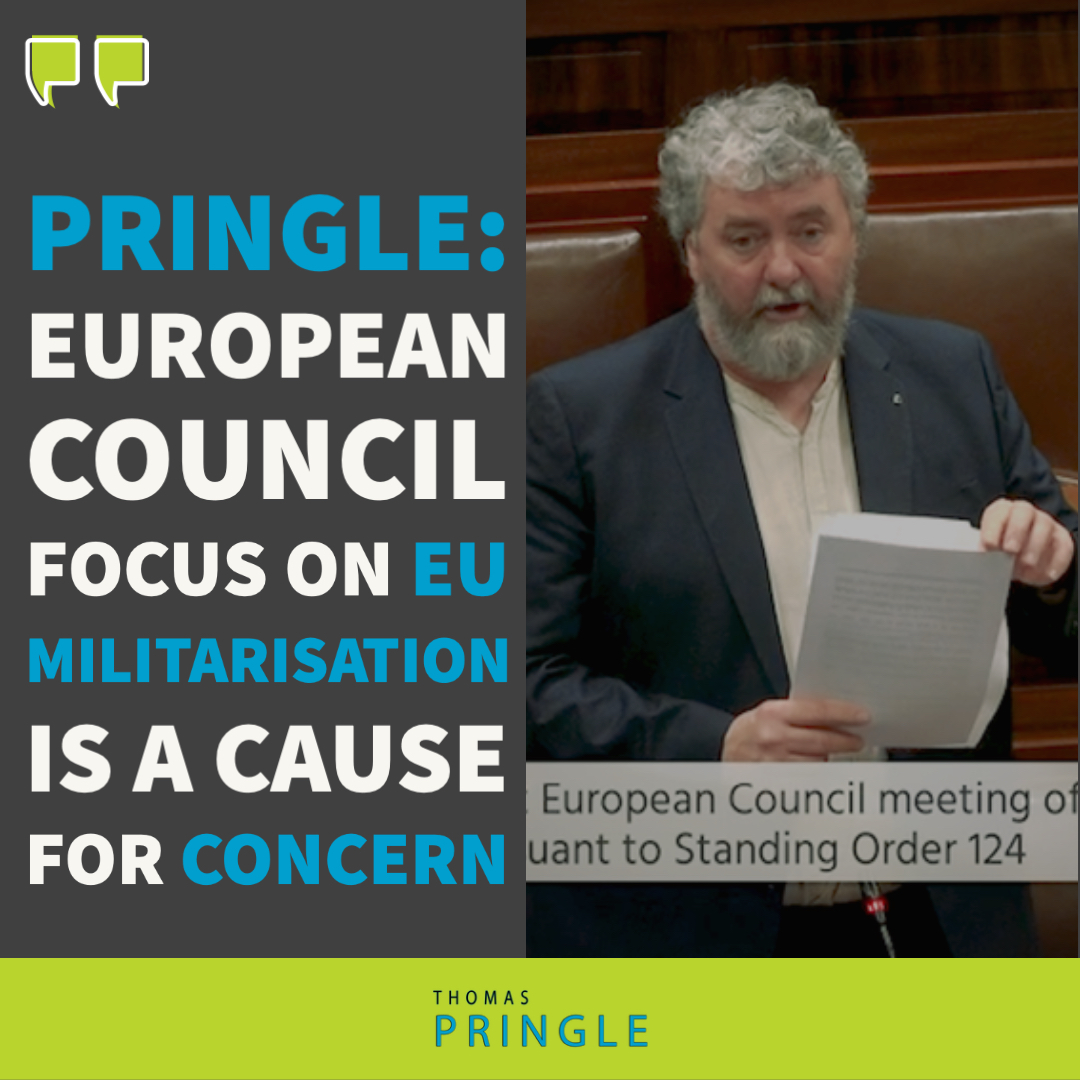- Pringle: We need a policy that recognises the importance of inshore fishing
- Pringle: Disabled people and carers face crisis of State neglect
- Pringle: Failed FF/FG housing policies forcing people to put their lives on hold
- Pringle welcomes Donegal council motion on Occupied Territories Bill: ‘We cannot stand by in the face of genocide’
Pringle: European Council focus on EU militarisation is a cause for concern
- Updated: 1st February 2023

Independent TD for Donegal, Thomas Pringle, said European Council focus on EU militarisation should be a cause for concern for the country.
Addressing the Dáil on Tuesday on the council’s recent meeting, Deputy Pringle said: “I was particularly concerned about this meeting’s focus on strengthening security and defence. The European Council’s conclusions support that the EU is ‘taking more responsibility for its own security and, in the field of defence, pursuing a strategic course of action and increasing its capacity to act autonomously’. The council, during their meeting, also called for a ‘commitment to invest in the capabilities necessary to conduct the full range of missions and operations, including a rapid deployment capacity’.
“The constant focus on EU militarisation and the steps towards an EU army should be a cause for concern for everyone in this country, as Ireland is being subtly roped into this,” he said.
The deputy spoke during post-European Council statements in relation to its Dec. 15th meeting.
Calling 2022 “a very challenging time for Irish neutrality,” he said: “The Government has assured us that this isn’t the case, but many of us in opposition see the different ways in which neutrality is slowly being eroded.”
Deputy Pringle said: “An Irish Times poll last year showed that a significant majority of people in Ireland disagreed with the statement that ‘Ireland should send military aid to Ukraine, even if it affects our neutrality’. Despite this, over the course of the year it seems that both the Government and the media are adamant to shift the public’s support for neutrality. Why is this?”
He said Irish representatives participated in January in a NATO Military Committee meeting on NATO strategy and war-fighting concepts. Deputy Pringle said: “Why would Ireland participate in these meetings when we are not a member of NATO? Why would we participate as a neutral country? And even more interestingly, why wasn’t it even reported on?
“Four EU members, Ireland, Malta, Austria and Cyprus, are neutral countries, however the EU are forcing us into alignment with NATO,” he said.
The deputy said: “I also thought it was interesting that the European Council reported that ‘the US is our foremost strategic partner and ally. We share deep and strategic ties.’ A strategic partner in what exactly? This is concerning especially when you consider the fact that Shannon Airport continues to be used by the US military to fuel the war in Ukraine and in the Middle East that they are involved in. This absolutely contradicts our obligations as a neutral country.
“We know that recently Zelenskyy asked the US Congress for more money for weapons that will likely be shipped through our country. We cannot allow this to go on while calling Ireland a country of peace.
“What we can do is provide a neutral voice at the negotiating table. We should be encouraging de-escalation and peace talks, not attending NATO strategy meetings,” he said.
He echoed the council’s condemnation of the death penalty sentences announced following ongoing protests in Iran, saying: “The right to peaceful protest is an extremely important right and I am shocked and saddened at the treatment of peaceful protesters in Iran, particularly women. The introduction of a death penalty at any time, under any circumstances, is unforgivable.”
Deputy Pringle said: “I agree with the council’s calls to ‘ensure the availability and affordability of agricultural products and fertilisers’. This is a very important topic and I feel that more time should have been spent addressing this than addressing security and defence at these council meetings.”



